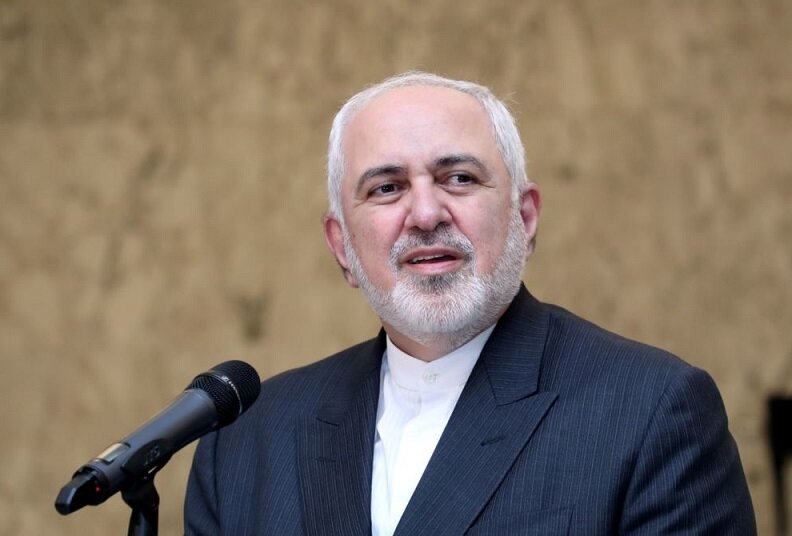FM Zarif welcomes Kuwait efforts to end Persian Gulf crisis

TEHRAN – Foreign Minister Mohammad Javad Zarif has welcomed the Kuwaiti mediation efforts to bring an end to the three-year-long crisis between Qatar and the so-called Arab Quartet, which includes Saudi Arabia, the United Arab Emirates, Bahrain, and Egypt.
“We welcome understandings in the Persian Gulf announced by Kuwait. Iran's longstanding policy is diplomacy, good neighborly relations & regional dialogue. We hope reconciliation contributes to stability and political & economic development for all peoples of our region,” Zarif said in a tweet on Friday, hours after Kuwait put out a statement saying that “fruitful” talks have been held between all sides of the rift.
Kuwaiti Foreign Minister Sheikh Ahmed Nasser al-Mohammad al-Sabah appeared on Kuwait’s state TV on Friday to read out a statement on the rift between Qatar and the Arab quartet.
“Fruitful discussions have taken place recently in which all sides expressed their keenness for [Persian] Gulf and Arab unity and stability, and to reach a final agreement that realizes lasting solidarity,” the chief Kuwaiti diplomat said.
Qatar was quick to welcome the Kuwaiti statement.
“The Kuwaiti statement is an imperative step towards resolving the GCC crisis. We express our gratitude to the State of Kuwait for their mediation & the United States for their efforts. The interest and security of the people of the [Persian] Gulf & the region remain our top priority,” Deputy Prime Minister and Minister of Foreign Affairs of Qatar Mohammad bin Abdulrahman said in a tweet.
Over the past three years, Kuwait has been engaged in continued mediation efforts to put an end to the bitter spat between its neighbors with no success. But a recent visit by an American delegation to both sides of the rift seems to have ultimately paved the way for Kuwait’s mediation efforts to bear fruit.
The Kuwaiti statement came on the heels of a not-so-public visit by the U.S. president’s advisor and son-in-law Jared Kushner to Qatar and Saudi Arabia.
In June 2017, the Arab quartet severed diplomatic ties with Qatar, imposing a total blockade on the tiny Persian Gulf nation. The UAE, Bahrain, and Saudi Arabia closed their airspace, land, and sea routes to Qatari planes, cars, and vessels, a move that prompted Qatar to use Iranian airspace. Kuwait, a country stuck in the middle of a dispute between its neighbors, had studiously worked to reconcile the opposing sides but to no avail.
But Kushner’s visit apparently changed the atmosphere.
In a last-ditch effort to secure an achievement for his father-in-law, Kushner recently paid a visit to Qatar and Saudi Arabia. He sought to convince the Saudi and Qatari leaders to reconcile and reach a deal on several outstanding issues, according to an Axios report.
White House envoy Avi Berkowitz, International Development Finance Corporation CEO Adam Boehler, and former Iran envoy Brian Hook accompanied Kushner.
Following the Kushner visit, the Kuwaiti foreign minister surprisingly announced that progress has been made in the talks between all sides of the row.
Mohammad bin Abdulrahman expressed optimism for a solution to the crisis.
“HE Deputy Prime Minister and Minister of Foreign Affairs Sheikh Mohamed bin Abdulrahman Al-Thani expressed the State of Qatar's optimism for a solution to the [Persian] Gulf crisis, and said that in Qatar we are very positive and always treat any initiative that brings peace in the region positively,” the Qatari Foreign Ministry said in a statement on Friday.
On the other hand, Saudi Arabia also expressed optimism that the three-year-long crisis will be resolved soon.
Saudi Arabian Foreign Minister Prince Faisal bin Farhan said on Saturday there has been “significant progress” in resolving the crisis that began in 2017.
“We have seen significant progress in the last few weeks, which means we are now hopeful we can reach a final conclusion very soon that will be satisfactory to all parties,” the Saudi foreign minister said in remarks made at the International Institute for Security Studies Manama Conference on Saturday.
SM/PA
